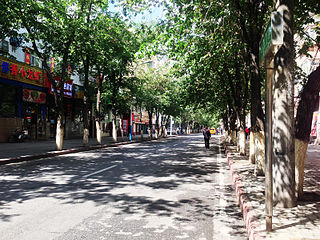 W
WThe 2010 Aksu bombing was a bombing in Aksu, Xinjiang, People's Republic of China that resulted in at least seven deaths and fourteen injuries when an Uyghur man detonated explosives in a crowd of police and paramilitary guards at about 10:30 on 19 August, using a three-wheeled vehicle. The assailant targeted police officers in the area, and most of the victims were also Uyghurs. Xinhua news agency reported that six people were involved in the attack, and two had died; the other four were detained by police.
 W
WThe 2008 Kashgar attack occurred on the morning of 4 August 2008 in the city of Kashgar in the Western Chinese province of Xinjiang. According to Chinese government sources, it was a terrorist attack perpetrated by two men with suspected ties to the Uyghur separatist movement. The men reportedly drove a truck into a group of approximately 70 jogging police officers, and proceeded to attack them with grenades and machetes, resulting in the death of sixteen officers. Foreign tourists who witnessed the scene provided a divergent account of events, saying that the attackers appeared to be machete-wielding paramilitary officers.
 W
WThe 2011 Kashgar attacks were a series of knife and bomb attacks in Kashgar, Xinjiang, China on July 30 and 31, 2011. On July 30, two Uyghur men hijacked a truck, killed its driver, and drove into a crowd of pedestrians. They got out of the truck and stabbed six people to death and injured 27 others. One of the attackers was killed by the crowd; the other was brought into custody. On July 31, a chain of two explosions started a fire at a downtown restaurant. A group of armed Uyghur men killed two people inside of the restaurant and four people outside, injuring 15 other people. Police shot five suspects dead, detained four, and killed two others who initially escaped arrest.
 W
WThe Shijiazhuang bombings, also known as Jin Ruchao bombings and March 16 bombings, were a series of bomb blasts that took place on March 16, 2001 in Shijiazhuang, the capital of Hebei province in North China. A total of 108 people were killed, and 38 others injured when within a short period of time several bombs exploded near four apartment buildings. Investigations found that Jin was motivated by hatred for his ex-wife, ex-mother-in-law and a lover; he had previously threatened to blow up their buildings.
 W
WA series of suspected bombs exploded outside the office of the Communist Party of China in Taiyuan, Shanxi, on November 6, 2013. The blast killed at least 1 and another 8 were injured. A 41-year-old Taiyuan resident, Feng Zhijun, was arrested on November 8.
 W
WOn 30 April 2014, a knife attack and bombing occurred in the Chinese city of Ürümqi, Xinjiang. The incident, a terrorist attack, left three people dead and seventy-nine others injured. The attack coincided with the conclusion of a visit by Xi Jinping, General Secretary of the Communist Party of China to the region.
 W
WOn 5 February 1992, four bombs exploded in public buildings and on two buses, line 2 and line 30, in Urumqi, Xinjiang, China. The bombings resulted in three deaths and 23 injuries.
 W
WOn February 25, 1997, three bombs exploded on three buses in Ürümqi, Xinjiang, China. Nine people were killed, including at least three children, and a further 28 were injured. Another two devices in the south railway station failed to explode. Steel balls, screws, and nails were found in the bombs.
 W
WOn the morning of 22 May 2014, two sport utility vehicles (SUVs) carrying five assailants were driven into a busy street market in Ürümqi, the capital of China's Xinjiang Uyghur Autonomous Region. Up to a dozen explosives were thrown at shoppers from the windows of the SUVs. The SUVs crashed into shoppers, then collided with each other and exploded. 43 people were killed, including 4 of the assailants, and more than 90 wounded, making this the deadliest attack of the Xinjiang conflict. The event was designated as a terrorist attack.